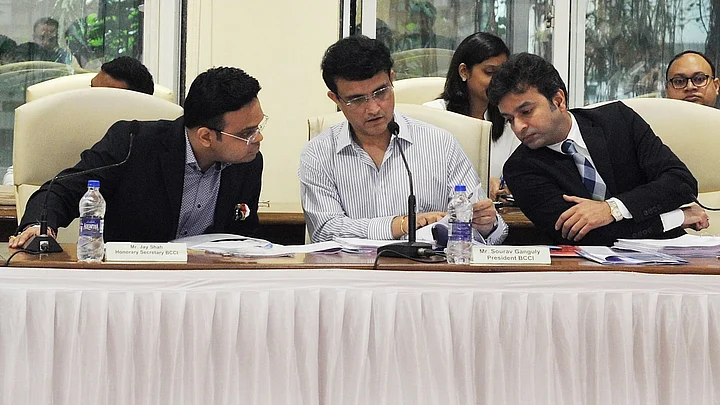President Sourav Ganguly along with the members of the Board of Control for Cricket in India (BCCI) met at the board headquarters in Mumbai for the 88th Annual General Meeting on Sunday, 1 December.
All the proposed changes listed in the notice sent out by secretary Jay Shah for the meeting on 9 November were approved, and will now be forwarded to the Supreme Court for approval.
The AGM started with remembering former Union Finance Minister and senior BJP leader Arun Jaitley, who passed away earlier this year. Jaitley was known as much for his political decision-making as he was for helping solve issues and provide roadmaps for the growth of BCCI over the years in several capacities.
Here’s a look at the highlights from the 88th Annual General Meeting:
1. Dilution of Tenure Gap
The most-talked about points on the agenda ahead of the meeting was the tenure cap, and the BCCI on Sunday approved the dilution of administrative reforms on the same for its office-bearers.
As per the current constitution, an office-bearer who has served two three-year terms, either at the BCCI or at the state association, goes into a compulsory three-year cooling-off period.
The current dispensation wants the cooling off period to kick in only after the individual has finished two terms (six years), at the board and state association separately.
Approval from the apex court for the removal of the cooling-off period would clear the path for an extended stint till 2024 for President Ganguly, who took charge on 23 October and is expected to vacate office next year. The move will also pave the way for Shah to get an extension as time left in his current tenure is also less than a year.
2. Jay Shah Named Representative at ICC
Secretary Shah has been named as the Board’s representative for future meetings of the International Cricket Council's (ICC) chief executives committee.
BCCI CEO Rahul Johri was the Board's representative for these meetings when its administration was being handled by the Supreme Court-appointed Committee of Administrators (CoA).
But with a full-fledged Board in office now, the role has gone back to the secretary's position.
The Board, however, has not yet decided on its representative for the ICC Board meetings.
3. Appointment of CAC Deferred
The BCCI decided to defer the appointment of the Cricket Advisory Committee (CAC). "It will be done after the 3 December hearing in the Supreme Court," an official said.
After Sachin Tendulkar, VVS Laxman and Ganguly stepped down from the CAC owing to the ‘Conflict of Interest’ clause in the new constitution, Kapil Dev, Shantha Rangaswamy and Anshuman Gaekwad appointed the men's team head coach with Ravi Shastri getting an extension for the top job.
“We will form CAC and we met (Ombudsman) Justice DK Jain. Me and VVS (Laxman) were cleared, we need to get proper clarity on what is conflict and and what is not.”Sourav Ganguly
“The clause stops everyone, that’s why we can’t make the CAC. Conflict (clause) should only be for us (the office-bearers). I don’t think Sachin and Laxman would want to come back,” he added.
The CAC has been mired in controversies owing to allegations of conflict of interest, which prompted the three original members to resign.
Both Rangaswamy and Gaekwad are now part of the apex council as representatives of the Indian Cricketers' Association. It is the CAC's prerogative to appoint the selection committee.
4. CoA’s Financial Steps Questioned
During the meeting, the members questioned some of the financial steps taken by the Committee of Administrators (COA) during their time in charge of the Board.
“Members raised several questions regarding the financial decisions taken during the CoA’s tenure,” an official present in the meeting said.
Former Treasurer Anirudh Chaudhry had earlier mentioned how Vinod Rai had not only failed the Board with respect to the ICC during his term as CoA chief, but also that his self-confessed relationship with ICC Chairman Shashank Manohar might have cost the Indian board dearly.
The CoA was in control of the cricket body for 33 months before the new office-bearers, led by Ganguly, took charge last month.
The accounts of the last three financial years were examined at the AGM.
5. Removing SC’s Approval
The Board also wants the court to keep out of future decisions on constitutional amendments and has proposed that a three-fourth majority at the AGM be enough to take a final call.
The officials believe it is not "practical" to take the Supreme Court's approval for every amendment, which is a must as per the existing constitution.
(With inputs from PTI and IANS)
(At The Quint, we question everything. Play an active role in shaping our journalism by becoming a member today.)
